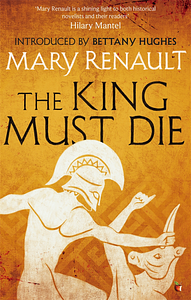Take a photo of a barcode or cover
adventurous
challenging
inspiring
mysterious
reflective
tense
medium-paced
Plot or Character Driven:
Plot
Strong character development:
Complicated
Loveable characters:
Complicated
Diverse cast of characters:
Yes
Flaws of characters a main focus:
Complicated
adventurous
medium-paced
Plot or Character Driven:
A mix
Strong character development:
Yes
Loveable characters:
Yes
Diverse cast of characters:
Yes
Flaws of characters a main focus:
No
adventurous
emotional
funny
sad
slow-paced
Plot or Character Driven:
Character
Strong character development:
Yes
Loveable characters:
Complicated
Diverse cast of characters:
Yes
Flaws of characters a main focus:
No
I really enjoyed this book, and especially the audio of it. The narrator did a wonderful job. If you like Ancient Greek history or mythology, you will likely enjoy this one.
I have a lot of conflicting feelings about The King Must Die.
Mary Renault is held up as the original and best reteller of ancient Greco-Roman myth and history for a reason. The story is engaging, especially the section in Crete, and well-paced, especially for an older book. It’s not a modern style, but if you’ve read other “literary classics” from the 50s and 60s, it’s easy to settle into.
But wow has this book not aged well.
There was a lot of misogyny in ancient Greece, and I don’t expect to open a book like this without encountering that as part of the culture. But for it to be encouraged? Feels supremely alienating.
There’s a long through line, worst in the Eleusis section, about how women being in power is bad and makes men “unmanly” and leads to horrific violence. Theseus holds these opinions and then is proven right by the narrative, leading to no other conclusion than readers are supposed to agree with him. It’s unsettling.
Medea is introduced and given zero wrinkles to her character before disappearing. She doesn’t need to be there long but Euripides was more sympathetic to her - far more. The original source material gave women complexity that this novel doesn’t.
There’s a hint of depth with Ariadne when she urges on the death of Asterion, and there are brief, glorious, shining moments when Theseus reflects on the future with Hippolyta and you get a touch of real love rather than him going through women like kleenex. But it’s not enough to account for the misogyny elsewhere.
I’m glad I’ve read it to say I’ve read this classic in the retellings field, and you can see the positive influence it had on others. But there are better, more complex, not sexist mythological retellings out there now. (Inside the Walls of Troy continues to be an underrated favorite).
Mary Renault is held up as the original and best reteller of ancient Greco-Roman myth and history for a reason. The story is engaging, especially the section in Crete, and well-paced, especially for an older book. It’s not a modern style, but if you’ve read other “literary classics” from the 50s and 60s, it’s easy to settle into.
But wow has this book not aged well.
There was a lot of misogyny in ancient Greece, and I don’t expect to open a book like this without encountering that as part of the culture. But for it to be encouraged? Feels supremely alienating.
There’s a long through line, worst in the Eleusis section, about how women being in power is bad and makes men “unmanly” and leads to horrific violence. Theseus holds these opinions and then is proven right by the narrative, leading to no other conclusion than readers are supposed to agree with him. It’s unsettling.
Medea is introduced and given zero wrinkles to her character before disappearing. She doesn’t need to be there long but Euripides was more sympathetic to her - far more. The original source material gave women complexity that this novel doesn’t.
There’s a hint of depth with Ariadne when she urges on the death of Asterion, and there are brief, glorious, shining moments when Theseus reflects on the future with Hippolyta and you get a touch of real love rather than him going through women like kleenex. But it’s not enough to account for the misogyny elsewhere.
I’m glad I’ve read it to say I’ve read this classic in the retellings field, and you can see the positive influence it had on others. But there are better, more complex, not sexist mythological retellings out there now. (Inside the Walls of Troy continues to be an underrated favorite).
slow-paced
Loveable characters:
No
The descriptions and language used were beautiful and really made me think about this book when I wasn't reading it. The plot lulled in places and honestly it's not fun to read about the overthrow of women's power and how obvious it is that men rule. Not sure how you get around that.
adventurous
emotional
informative
inspiring
tense
fast-paced
Plot or Character Driven:
A mix
Strong character development:
Yes
Loveable characters:
Complicated
Diverse cast of characters:
Complicated
Flaws of characters a main focus:
Yes
‘Listen, and do not forget, and I will show you a mystery. It is not the sacrifice, whether it comes in youth or age, or the god remits it; it is not the bloodletting that calls down power. It is the consenting, Theseus. The readiness is all.' [p. 17]
Definitely a reread, and I can remember when and where I first read it: in the library during study period in my third year at secondary school. I also remembered encountering the quotations from this novel in the chapter-headings of Watership Down, my favourite book when I was nine or ten years old... I remembered most of the details of The King Must Die, despite not having reread in the last couple of decades: I had forgotten (or never noticed) just how many hints of other myths -- Orpheus, an anachronistic Agamemnon, Jason -- are present, and how much they are woven into the theme of goddess-worship.
Theseus grows up in the citadel of Troizen, where his grandfather teaches him about moira, '‘The finished shape of our fate, the line drawn round it. It is the task the gods allot us, and the share of glory they allow; the limits we must not pass; and our appointed end.' [p. 15]. He doesn't know who his father is, but decides after experiencing 'earthquake aura' that it must be the god Poseidon. When he's seventeen, his mother tells him that his father is Aigeus, the King of Athens. Theseus sets out to find him, encountering many adventures en route, and becoming Year-King (doomed to death next year) in Eleusis: and when he reaches Athens, his father's wife Medea tries to poison him.
When it comes time for the tribute to Minos, Theseus is one of the party: seven youths and seven maidens, sent to Crete to die in the Labyrinth. There, he forges a loyal and lucky bull-dancing team; falls in love lust with Minos' daughter Ariadne, a living goddess; foments a rebellion; foresees an earthquake; and elopes from the ruins of Minoan civilisation with Ariadne, who he abandons on Naxos.
All true to the myth: but with the possible exception of the earthquake aura (a sensitivity that many animals possess) none of it is supernatural or mystical, except that Theseus interprets it so. Renault's ancient world is rooted in archaeological evidence and in the tension between the 'sky gods' and the ancient matriarchal religion. Theseus seemed heroic to my teenage self: now I read him as misogynist, violent, arrogant and hot-tempered. (So: heroic!)
I still love this novel: and I still wonder, as I have wondered for nearly fifty years, exactly what Ariadne has in her hand after the Bacchic revels.
Great introduction by Bettany Hughes, too: 'not fact-bound chronicles, but respectful dances with antiquity' [loc. 155]. She stresses that "The ancient Greek muthoi, myths, does not mean fairy-tales, but rather points of information – things seen or experienced to be shared for the benefit of humankind."
adventurous
dark
mysterious
reflective
medium-paced
Plot or Character Driven:
A mix
Strong character development:
Yes
Loveable characters:
Yes
Diverse cast of characters:
No
Flaws of characters a main focus:
Complicated
the predecessor of the Hunger Games!
“They were all quiet, as if they heard the harper. I could not have done it by myself. Something hung in the air between us, and out of that I spoke. A bard will tell you it is the presence of the god.”
adventurous
medium-paced
Plot or Character Driven:
Character
Strong character development:
Complicated
Loveable characters:
Complicated
Diverse cast of characters:
No
Flaws of characters a main focus:
No
adventurous
medium-paced
Plot or Character Driven:
Character
Strong character development:
Yes
Loveable characters:
Yes
Diverse cast of characters:
No
Flaws of characters a main focus:
Yes



